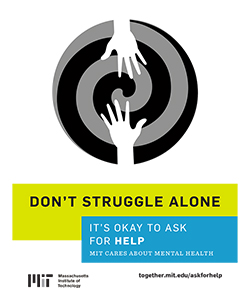
| Vol.
XXVIII No.
1 September / October 2015 |
| contents |
| Printable Version |
Enhanced Mental Health Initiatives
and MindHandHeart Announced
In a letter to the community on September 2, 2015, Chancellor Cynthia Barnhart and MIT Medical Director William Kettyle announced immediate and long-term actions to enhance mental health and well-being at MIT.
Barnhart and Kettyle described listening to students, faculty, and staff, and responding to the main themes they heard:
- More counseling and support options will help students; and
- The best way to build a healthier, stronger MIT is by leveraging the innovative problem-solving skills and knowledge of our whole community.
New initiatives at MIT Medical and Mental Health and Counseling Service (MH&C) include:
- Adding two new full-time psychologists by the end of September (Student Support Services is also increasing their staffing levels);
- Opening a new MH&C location on main campus for drop-in consultations:
Starting on September 22, an MH&C clinician will be available in 8-316 to students for informal, confidential 20-minute consultations from 1-3 p.m., Tuesdays through Fridays. Walk-in hours for more urgent concerns continue to be available at MH&C (E23, 3rd floor) weekdays from 2-4 p.m.
- Adding an online appointment request form on MIT Medical’s website beginning September 10;
- Monitoring and sharing with students the availability and specialties of local providers who are accepting new patients;
- This summer, Student Outreach and Support, in collaboration with MH&C, trained 32 new students to serve as “Peer Ears.” This more than triples the number of confidential peer-to-peer support providers available in MIT residence halls to help students navigate academic and social life at MIT.
Barnhart and Kettyle also announced the MindHandHeart Initiative. The goal of the holistic, campus-wide effort sponsored by both the Chancellor’s Office and MIT Medical is two-fold: over time, we want members of our community to feel more comfortable asking for help when they need it, and we want to build a healthier, stronger community.
MindHandHeart is co-chaired by Professor Rosalind Picard and consists of a steering committee and working groups of students, faculty, and student health and wellness experts. The steering committee and working groups are responsible for working to align existing support services and developing and implementing new innovative efforts. Their work will be guided in part by the recent results of the 2015 Healthy Minds Study, available at chancellor.mit.edu/data.

To make progress, MindHandHeart requires strong community engagement. Barnhart and Kettyle encouraged community members to take part in several ways, including:
- Submitting proposals to the MindHandHeart Innovation Fund;
- Displaying the postcards and reading materials from the “Don’t struggle alone – it’s OK to ask for help” public awareness campaign;
- Signing up to volunteer on MindHandHeart’s working groups or research and student councils.
| Back to top | |
| Send your comments |
| home this issue archives editorial board contact us faculty website |